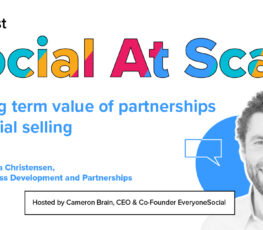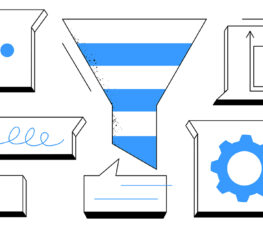The Importance of Relationship Selling
Learn everything about relationship selling, why it is still an important tactic to master and more.
As the world of sales continues to change and evolve, so has the number of sales tactics and various technologies to help teams close new customers and retain current ones.
Many of the old school sales tactics don’t always necessarily work and having too many new ones in place can also cause challenges.
It’s a tough world for salespeople, especially in B2B. But there is also a wealth of knowledge and techniques out there that will help sales teams achieve success and reach their goals.
While it is easy to be inundated with information thanks to the internet and the thousands of sales gurus saying different things — there is still one sales tactic that every salesperson should still master: relationship selling.
What is Relationship Selling?
Anyone in sales might be familiar with the term and may even be perceived as an “old school” tactic, but it is still one that is incredibly important today.
As the name generally implies, relationship selling is all about the connection and relationship a salesperson builds with their customers and potential buyers.
A human interaction, where the salesperson generally cares about connecting with their customer or buyer.
Instead of salespeople solely focusing on the pricing of a product or services (or even all the details about said product or service), the priority is on the interactions and trust built between sales and the customer/buyer.
Of course, product details and pricing are important topics to discuss, but without building a rapport with a buyer, you can miss out on long-term revenue and much more.
Additionally, relationship selling is generally used for companies who have longer sales cycles, expensive products or software, or things that require more commitment when it comes to purchasing.
Many times a software solution may take weeks or months for a decision made based on the buyer researching, comparing to competitors, working to get budget, etc.
By caring about building relationships with potential customers and taking an interest in their world, it can significantly improve the odds of securing a sale and retaining that customer for the long-term.
Why Relationship Selling Matters
Typically, this sales technique is prominent for companies selling products and services that rely on repeat business from customers, such as insurance policies, but it also is valuable to B2B businesses in general.
There were a few stats for B2B that stood out in this article:
- 82% of B2B decision-makers think sales reps are unprepared.
- In B2B, 68% of customers are lost because of indifference or perceived apathy, not because of mistakes.
- According to Gallop, only 46% of customers said vendors deliver on what was promised.
Those kinds of stats show why focusing on relationship selling and generally showing an interest in more than a sale is important.
Plus, with all the tools and sales technology it can be distracting and make it seem that those items are enough to build sales.
But building a rapport with customers and new buyers matters. Here’s why:
Want expertly crafted content to help refine your marketing, social selling, and recruiting strategies? Sign up for our newsletter and get a copy of our Personal Brand Starter Kit. 👇
Current customers or clients
One of the main reasons relationship selling exists is to boost salespeoples’ personal connection to their customers and clients.
Without building a working relationship, customers may feel like they are just a number.
Worse, they may not view you as a trustworthy person, especially if you aren’t delivering on things you previously discussed.
Now when it comes to re-signing a contract or continuing a working relationship, they may feel less important have a much greater chance of churn and moving on to a competitor. Costing you a long-term sale.
But it can also affect the chances of up-selling them and hurt your word-of-mouth marketing to their colleagues, who may have also bought your product or services too.
For B2B, word-of-mouth praise and recommendations can really elevate sales and deals.
Potential buyers
While relationship selling techniques are important for customers and clients, it also can affect potential buyers who are talking with you and closing in on a purchasing decision.
It’s true that it is generally easier to keep a current customer than trying to securing a brand new one. But it is why relationship selling is even more important for new potential buyers.
Without trying to build a connection, the buyer may feel like they are only a bunch of dollar signs to you.
While you make get some sales that way, there’s not much trust or confidence built that way. People coming to you who are brand new don’t know you well and will generally start formulating an opinion of you right away.
Even if you have the best product or pricing, you can still cause a sale to not close because of your own selfish interests or lack of interest in their challenges.
Relationship Selling Techniques
Because the tactic of relationship selling has been around for quite awhile, there are plenty of techniques out there.
However, with the shift of technology, platforms, and industries, some of those techniques may not necessarily be useful.
Yet, there are many that still matter and new relationship selling techniques have also developed in the last few years. Let’s explore some of the ones all salespeople should be practicing for success.
Become an active listener
It’s easy for sales to ramble on because of excitement about the product and being focused on closing the deal.
But in order to find success and connect with a customer or buyer, you need to speak less and actually engage more in listening.
Prospects and customers will like you more, but it will help you understand what their needs are and their challenges. Thus, helping you tailor your pitch and solutions to them effectively.
Practice social selling to add value
B2B sales cycles can be long, some can easily take a few months or even close to a year. During this time, a great aspect to building a relationship is connecting with the person on social media accounts.
Social selling itself is a whole separate tactic but is the perfect technique to add to your relationship selling practices. Why?
- 9 out of 10 B2B buyers say online content has a moderate to major effect on purchasing decisions. (Source)
- 84% of CEOs and VPs use social media to make purchasing decisions. (Source)
- 80% of business decision-makers prefer to get company information from a series of articles versus an advertisement. (Source)
- 55% of B2B buyers search for information on social media (Source)
- Sales reps using social media as part of their sales techniques outsell 78% of their peers (Source)
Interact with their social content, leave comments, and share company and third-party content on your own social accounts.
This way you are keeping your name in front of them online during the sale cycle and providing value too. Same applies to current customers, keep nurturing them through genuine social interest.
Related: Wondering what type of content you should be sharing to your networks? Here are 7 Types of Content B2B Salespeople Should Be Sharing to Their Social Networks.
Relate on a personal level
For relationship selling to work, you need to connect with prospects and clients on a personal level, essentially building a friendship.
This doesn’t mean small talk, because that is all-too-common and doesn’t add value to the conversation.
Instead, learn about their outside interests, see what they are posting about on social media as talking points, follow their company news, etc. Start finding unique ways to spark a conversation where you both have common interests or can relate in some way.
This helps build your profile as not just another salesperson, but an actual human being who has something interesting to say.
Keep your word and be honest to build trust
The second you break a promise, do not deliver something you said you would, or follow-up when you said, you are damaging your trust and reputation.
Of course, things come up and life happens, but stick to any commitments or dates as best you can.
Building a positive working relationship with someone takes trust and you being reliable. If you are missing deadlines and not delivering what was promised, you can easily lose a sale or find your working relationship going nowhere.
Same goes with honesty. Salespeople sometimes unfairly are portrayed in a negative light, so some prospects will already tread lightly.
However, if you can be honest from the start about everything from pricing, solution fit, no hidden contract surprises, etc. your relationship will be off to a better start. Even if your product or services is not a good fit, say that and refer your competitors.
You might lose that particular sale, but they’ll appreciate the honesty and may refer others to your product or services.
Don’t fake it until you make it – be real
I’m sure you’ve heard the saying before, “Fake it ‘till you make it,” but with sales, this is not the approach you want to take.
Your prospects and customers can tell when you’re are faking it for the sake of a sale, which is never good for a working relationship.
Being genuine is key technique and being a real person will go a long way in your relationship selling and connect with your prospects and customers.
Plus, if you love the product or services and company you work for, being genuine should come naturally without a need to “pretend.”
As a salesperson, you won’t have all the answers and may make mistakes, but if you are being yourself an act like a normal human being you’ll be treated with more respect.
Final Thoughts
The concept of relationship selling has been around for a long time, but even in the digital age with advancement in sales tools, this is still an important tactic to master.
But it makes sense, building positive working relationships will be key to closing a new deal, retaining current customers for the long-haul, and developing a trust that can lead to new referrals.
While the relationship selling process seems pretty simple, many sales teams forget the basics and the importance of caring more about the individual than just the sale. Whether you are new to the concept or just need a reminder, this post should be helpful.
















